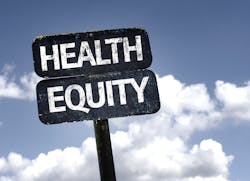On Feb. 16, Marcella Nunez-Smith, M.D., M.H.S., who chairs the Biden administration’s COVID-19 Health Equity Task Force, spoke to the annual Health Datapalooza and National Health Policy Conference about the importance of better data gathering to equity efforts.
“Piecemeal collection of data is just one part of a larger, long-standing lack of the contextual data that we need to target resources,” said Nunez-Smith, an associate professor of medicine and epidemiology at the Yale School of Medicine, where she is also associate dean for health equity research and founding director of the Equity Research and Innovation Center. “In order to disrupt the predictability of health inequities, we need better data related to the conditions of place by environmental pollution, clean water, as well as nutrition, housing security, and basic needs, just to name a few. This is all part of the conversation we need to have around social and structural drivers of health.”
Communities of color have experienced drastically worse outcomes from COVID-19, she said. In 2020, indigenous, Pacific Islander, Black and Latino Americans saw mortality rates that were twice as high as White Americans from COVID-19.
“It's important for us to say we're seeing disparities beyond race and ethnicity as well,” Nunez-Smith told the online audience. “If you think about rural communities, undocumented immigrants, Americans with disabilities, people experiencing homelessness, those who are incarcerated, or people who are institutionalized, we know the pandemic has exacerbated difficulties already faced by these groups. Many of the groups I just referenced are still largely underrepresented in our data and in our research.”
Getting a consistent handle on COVID-19’s sweeping inequities has been challenging. “In addition to race, we know place matters in terms of health,” Nunez-Smith noted, adding that 80 percent of rural areas are designated as medically underserved, and rural populations are also more likely to be struggling economically. Recent studies show that at least 20 percent of rural Americans have lost a full-time source of income.
Washington D.C., she added, has the nation's highest rate of homelessness. “People experiencing homelessness have been more than three times as likely to die from COVID-related complications. Undocumented immigrants, also often excluded from the social safety net, are largely unseen in our data, and more likely to be in high-risk positions,” she explained.
Another reality, Nunez-Smith said, is that clinical care delivery and research cannot continue to operate in silos. “Apart from these drivers, we need to develop practices for integrating the living conditions of our patients into the care that they receive. I know many of you here today are working tirelessly already to take a whole system redesign approach with these needs in mind. Effective policy solutions require comprehensive, high-quality data,” she added. “We are woefully behind on that front in terms of where we need to be in order to respond equitably and efficiently to this crisis. We know that as we move through COVID-19, through the response to the recovery, we need to be intentional about building resilience in our healthcare systems as well as in our partnering communities.”
President Biden's national strategy for responding to COVID-19 prioritizes equity at every step of the way, she stressed, a commitment evidenced in part by the creation of a COVID-19 Health Equity Task Force. “This task force, which I will chair, will provide specific and actionable recommendations to mitigate the severe disparities and outcomes and help direct and target resources to address inequities at a structural and policy level.” The national plan calls for bolstering data systems and transparency in tracking the distribution of vaccination throughout the country. “This is a vital step in moving toward creating a data infrastructure that doesn't exclude entire communities.”
Nunez-Smith said that getting hundreds of millions of Americans vaccinated is an extraordinary undertaking, and it requires the federal government to work very closely with states and localities. “The administration will focus on integrating critical software systems streamlining data-reporting processes, putting systems in place to track the course of this pandemic, and to effectively manage future public health crises,” she added. “We now have demographic data related to vaccinations posted on the CDC website. As we strive to improve the quality and completeness of race and ethnicity data, we will have comprehensive data that will directly drive equity throughout the vaccination campaign and into the future.”
President Biden signed an executive order that directs federal agencies to increase collection and reporting of the health data needed for highrisk populations. Using these data, the federal government will identify exactly where the vaccines are most needed, with parameters such as social vulnerability in mind, Nunez-Smith said.
The Department of Health and Human Services will also optimize data collection from public and private entities to increase the availability by race, ethnicity, geography, and disability. “These data will continue to allow us to understand differential case rates by setting as you think about long-term care facilities, prisons, jails, detention centers, other congregate settings, to track hospital ICU capacity, our effectiveness in terms of contact tracing and quarantining and adherence to physical distancing and masking,” she said. The data will shed light on the varying levels of access that communities have to the healthcare they need more broadly.
Looking beyond the pandemic, she called it “simply unacceptable” that so many individuals go without the care they need and deserve. “The national strategy will work to fill in these gaps in both the short and long term. The continued surge of COVID-19 is just accentuating the dire outcomes of a system in which many people still lack access to affordable and high-quality care. This is why the federal government's COVID-19 response includes policy recommendations that align federal levers with improved clinical outcomes for more people. And specifically, we're aiming to increase funding for community health centers, to provide greater assistance to safety net institutions to strengthen home- and community-based services and to expand mental health care.” (Community health centers provide primary health care to nearly 30 million people, the majority of whom are people of color in every state and territory, including one in five rural residents who live in poverty, and more than 1 million people who work in the agricultural sector or who experienced homelessness.)
Prior to the pandemic, many marginalized communities, the ones hardest hit by COVID-19, already struggled with meeting their basic needs, such as access to nutritious food, adequate housing and transportation, Nunez-Smith said. “We all know the pandemic took advantage of these challenges, and made it more difficult for many people to adhere to public health guidelines around things like social distancing, isolation and quarantining. We know that staying at home is a privilege, and that many are unable to do so. So I'm very pleased to report that the administration is committed to recognizing those realities and addressing those needs. And that includes working to provide paid sick leave, child care support, and rental assistance with the requested congressional appropriations.”
The national strategy also will invest in the long-term health of communities by expanding clinical and public health workforces in the places that currently lack these resources. As well as deploying federal workers to assist with the COVID response and medically underserved areas, she said, the plan creates a sustainable public health workforce program that will provide care for communities in ways that make sense for them. These workers will be recruited from the communities where they will serve one step towards building trust in our government health care institutions.
Nunez-Smith said that a vital component of the administration's data-driven plan will be making data accessible to the public. “Data transparency and scientific honesty are key ingredients as we work to rebuild trust. The CDC will maintain a public dashboard of COVID-19 cases at the county level so that individuals can gauge the risk in their own communities and make informed decisions based on that information,” she said.
In closing, she noted that COVID-19 has indeed revealed long-standing and pervasive health inequities, and there are many challenges that need to be addressed, “but there are also opportunities to adopt, to innovate on best practices. Organizations and states can work to build our own health equity task forces to more deeply focus in on local challenges, and several outstanding models already exists. Together, we can rebuild systems that work for everyone.”


